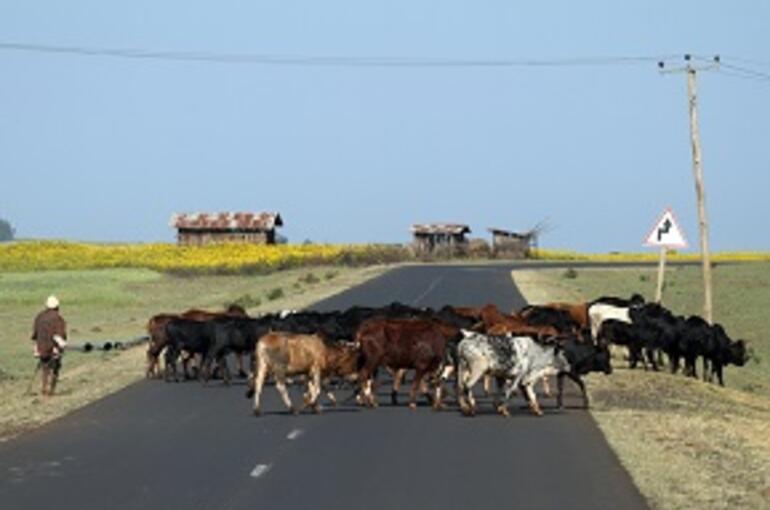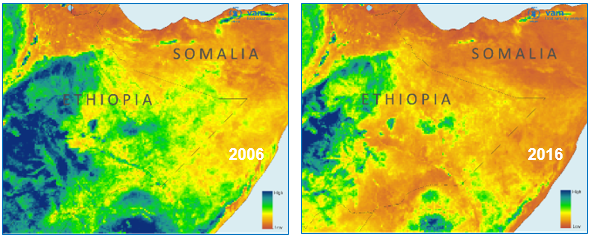- FR
- EN

SCOR is pleased to support the launch of the Satellite Index Insurance for Pastoralists in Ethiopia. This insurance product uses state of the art technology to help build drought resilience in poor pastoralist households.
In its continued efforts to promote the development of insurance products for largely underinsured field of pastures, SCOR is pleased to support the launch of the Satellite Index Insurance for Pastoralists in Ethiopia (SIIPE). Under this project, initiated by the World Food Programme (WFP) and facilitated by Willis Towers Watson, SCOR not only provides reinsurance support but also lends technical support for model validation and programme pricing.
Ethiopia's economy is agriculture-based, including crop and livestock production: in 2010 agriculture contributed 50% of total GDP, while in 2013, 82.5% of the population was rural-based and 76% of the total labour force was involved in agriculture (FAO). Ethiopia has the largest livestock population in Africa and the livestock sub-sector contributes an estimated 12% of total GDP and over 45% of Agricultural GDP.
For pastoralists, livestock are the main source of livelihoods, food and animal traction in farms, but most importantly livestock are the traditional and most trusted form of savings assets which reflects the importance of the sub-sector for the economy as well as the populace.
For pastoralists, livestock are the main source of livelihoods, food and animal traction in farms, but most importantly livestock are the traditional and most trusted form of savings assets which reflects the importance of the sub-sector for the economy as well as the populace.
While there are existing livestock insurance products that work as an Asset Replacement policy, the focus of SIIPE is to provide livestock Asset Protection insurance with the objective of keeping core breeding animals alive during major droughts – in other words, to build drought resilience in poor pastoralist households. The in-season payouts ensure that the pastoralists have cash in hand when they need it the most, not after the damage has already been done.
The cover, which runs for seven months across two seasons in the year, uses cutting edge satellite technology to gauge the availability of forage to pastoralists. The product index is based on NDVI in the predefined regions with triggers calibrated to ensure that payouts start to trigger when pasture and grazing resources are reduced to a point where animals will start to be stressed due to inadequate nourishment. The independent calculation agent for the index is the National Meteorological Agency, Ethiopia.
NDVI for Ethiopia’s Somali region as in November for 2006 (good) and 2016 (bad) seasons: brown shades correspond to bare soil, greens and blues to progressively denser vegetated ground.
Left, during November 2006, a year of plentiful rains in comparison to right, during November 2016, a recent drought affected season. SIIPE relies on the detection and quantification of the magnitude of these variations.
The project, implemented by a pool of four local Ethiopian insurance companies, now covers 5,001 households in the Somali Regional State of Ethiopia. The minimum number for each beneficiary covered under the project is 5 Tropical Livestock Units (TLUs) and the beneficiaries are identified by Bureau of Agriculture and Natural Resources Development, with a focus on small herders. The Sum Insured for the cover is based on the minimum daily nutritional requirements for each insured species. The Sum Insured is split equally between the two seasons with the possibility of paying out up to half of the seasonal sum insured in the form of in-season payout while the premium has been supported by the WFP.
In continuation to its commitment to promote sustainable development of insurance, SCOR’s agriculture team is pleased to support this programme and facilitate the scale-up of this highly pragmatic product. We look forward to working with the project’s partners to help improve risk management for pastoralists. This is just a starting point from which we can expand to help millions of pastoralists in Africa and elsewhere.
